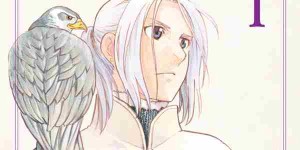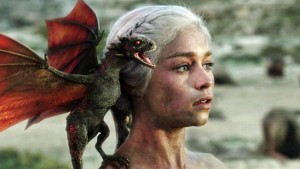Arslan vs Game of Thrones
April 10, 2015 · 0 comments
By Andrew Osmond
 The new anime version of Heroic Legend of Arslan is underway. Our recent preview of the show went through the basics; how it’s a serious fantasy about human not magic conflicts, based on a manga by Hiromu Arakawa (Fullmetal Alchemist), which in turn comes from novels by Yoshiki Tanaka (Legend of the Galactic Heroes). Tanaka’s books date from 1986, yet Arslan has things in common with a more recent fantasy phenomenon. Yes, we mean Game of Thrones, about to start its fifth season.
The new anime version of Heroic Legend of Arslan is underway. Our recent preview of the show went through the basics; how it’s a serious fantasy about human not magic conflicts, based on a manga by Hiromu Arakawa (Fullmetal Alchemist), which in turn comes from novels by Yoshiki Tanaka (Legend of the Galactic Heroes). Tanaka’s books date from 1986, yet Arslan has things in common with a more recent fantasy phenomenon. Yes, we mean Game of Thrones, about to start its fifth season.
One obvious common ground between the shows is that both Arslan and Thrones play down the magic and monsters. There certainly aren’t any in Arslan’s first episode, barring one licky giraffe. Both fantasies are also rooted in real history. Game of Thrones author George R.R. Martin was heavily inspired by England’s Wars of the Roses in the fifteenth century, which have become newsworthy in recent weeks. Many fans argue which Thrones characters map onto which historic figures, though it’s easy to see where the warring families of Starks (Yorks) and Lannisters (Lancasters) come from. There’s a good write-up of the topic here.
 Arslan is inspired by much older history. The kingdom of Pars in the first TV episode is modelled on Persia, now Iran. Tanaka said he came up with Persia as a “different area” for a sword-fighting story; he didn’t want to use Japan, or tread on the toes of the Guin Saga books by Kaoru Kurimoto. However, Tanaka and Arakawa admitted in a talk in the first book of the Arslan manga that they were loose with historical details.
Arslan is inspired by much older history. The kingdom of Pars in the first TV episode is modelled on Persia, now Iran. Tanaka said he came up with Persia as a “different area” for a sword-fighting story; he didn’t want to use Japan, or tread on the toes of the Guin Saga books by Kaoru Kurimoto. However, Tanaka and Arakawa admitted in a talk in the first book of the Arslan manga that they were loose with historical details.
Tanaka said he did no on-site research: “I have a strong tendency towards fantasising, and whenever I come up with any single thing, I feel as though I can see everything around it too.” Arakawa points out there’s not much to research, given the last Persian empire (there were several) fell in the mid-seventh century. “There are stone monuments and statues and eating utensils and such, and I can just barely manage to imagine what kind of clothes they might have worn at that time. Since this is fantasy, there are many points that are supplemented by imagination.”
Arslan and Thrones share a view of history, one where events are not caused by invisible hands or grey-cloaked wizards, but by a range of people, their chance interactions and sheer blind chance. There is no Gandalf in this worldview, no true king coming forth – though royal power, and the loyalty it inspires, is tremendously important. Arakawa speaks of how Arslan’s characters have an ‘amazing’ power to move their story along, not following a designated quest.
Tanaka says, “A standard in Grimm’s fairy tales or stories in alternate worlds is for a boy raised in a small hut in the middle of a forest to actually be the descendant of the royal bloodline… There are those kinds of tales in which an exile of noble birth overcomes trial and tribulation to become of value… I read several volumes of stuff like that and thought, ‘How about trying to write something that’s the opposite of this?’”
 The reader could reply that actually both Arslan and Thrones have exiled royals! Thrones has Daenerys, the deposed king’s daughter played by Emilia Clark, even if she started off playing second fiddle to her obnoxious brother (remember what happened to him?). Arslan has… well, you can probably guess from the title. But in both fantasies, the characters aren’t peasant kids, ignorant of their destiny. Rather the protagonists are fully conscious of what they’ve lost; it goads them to shape their destinies, using royal glamour to influence those around them. Having dragons helps too, as Daenerys knows.
The reader could reply that actually both Arslan and Thrones have exiled royals! Thrones has Daenerys, the deposed king’s daughter played by Emilia Clark, even if she started off playing second fiddle to her obnoxious brother (remember what happened to him?). Arslan has… well, you can probably guess from the title. But in both fantasies, the characters aren’t peasant kids, ignorant of their destiny. Rather the protagonists are fully conscious of what they’ve lost; it goads them to shape their destinies, using royal glamour to influence those around them. Having dragons helps too, as Daenerys knows.
Both fantasies have characters believably shaped by the worlds they live in. Two of the most decent characters in Thrones are Ned Stark (such a pity!) and Tyrion Lannister. Yet in the first episode, Stark is shown beheading a deserter soldier in front of his ten year-old son, while Tyrion romps with prostitutes. Arslan doesn’t go that far, but it does show the title boy prince sees nothing wrong with slavery, accepting it as a civilised institution.
Thrones, of course, is famous for its lashings of sex and violence (yes, we’ve seen “The Mountain and the Viper” episode). In this respect, its anime precursor is arguably not Arslan but the gruesome Berserk. (The British precursor to Game of Thrones is surely I, Claudius, the scandalous 1970s BBC version of Robert Graves’ novels of Ancient Rome – think John Hurt Ate My Baby.) Actually, Arakawa’s Arslan manga is darned violent in places; there’s infanticide, strangling, beheadings, burnings, a river of corpses and some very bloody killings. A sword-in-mouth bit might make even Thrones fans wince.
 “On the enemy’s side (in Arslan), there is a kind evil religion that would even harm babies…but I look forward to feeling like ‘I wonder how much of this I’ll be allowed to draw?’” Arakawa says. Anime often tones down violent manga – Berserk is a prime case – and the opening battle in the Arslan anime is pretty bloodless. However, a dark twist at the end of part one suggests the show won’t soft-pedal things too much. And the anime Arslan has a big advantage over Thrones – cheaper battles! Thrones’ first season cheekily cut a costly battle altogether by knocking the main character unconscious, though later episodes splurged on spectacle.
“On the enemy’s side (in Arslan), there is a kind evil religion that would even harm babies…but I look forward to feeling like ‘I wonder how much of this I’ll be allowed to draw?’” Arakawa says. Anime often tones down violent manga – Berserk is a prime case – and the opening battle in the Arslan anime is pretty bloodless. However, a dark twist at the end of part one suggests the show won’t soft-pedal things too much. And the anime Arslan has a big advantage over Thrones – cheaper battles! Thrones’ first season cheekily cut a costly battle altogether by knocking the main character unconscious, though later episodes splurged on spectacle.
True, Thrones isn’t just about the gory violence but the fact pretty much anyone can die horribly at any time… though a few Thrones characters seem protected by their fan popularity (remember Misery?) On the other side, the name The Heroic Legend of Arslan suggests that Arslan must last to the end of the story, though there are exceptions – think of the legendary last charge of El Cid.
There’s a final issue that both Martin and Arakawa know well – what happens when an adaptation overtakes its source? In Arakawa’s case, the first anime adaptation of her Fullmetal Alchemist was made while she was still writing the strip. Soon enough, the anime (also called Fullmetal Alchemist) overtook the manga and went its own merry way, ending up in Nazi Germany. According to Wikipedia, Arakawa herself requested the anime go its own route, and was amazed by the result. Her own ending was adapted in the remake anime, Fullmetal Alchemist: Brotherhood.
Interestingly, it seems from the Arslan interview that the story in the first anime episode – in which an eleven year-old Arslan encounters a runaway prisoner, and has his beliefs challenged – is Arakawa’s invention, not drawn from Tanaka’s books. If Arakawa can interpolate her own material so confidently, it suggests she’s learned from her Alchemist experience. (In the interview, Tanaka graciously compliments Arakawa on her additions to his story.)
On the Thrones side, fans are all too aware of the stakes. The Thrones books are still unfinished, and the TV version has nearly caught up. Last month, it was confirmed that the series will indeed overtake the novels, although showrunner David Benioff claimed, “We’ll meet up pretty much at the same place George is going.” Even so, it’s an awkward position. Martin faces being ‘spoiled’ by the adaptation of his opus, and if he diverges fans may accuse him of sabotaging the real, TV ending. As Cracked.com commented, what happens if one Thrones character saves the world on TV, but gets flambéed by the dragons on the page?
Well, there’s an answer; tell the story all the way through again, this time with Martin’s ending. Calling it Brotherhood wouldn’t quite work, though. How about Game of Thrones: Twinning?
Andrew Osmond is the author of 100 Animated Feature Films. Heroic Legend of Arslan streams from Anime Ltd now at Viewster.com.
anime, Arslan, fantasy, Game of Thrones, George Martin, Heroic Legend of Arslan, Yoshiki Tanaka
Leave a Reply